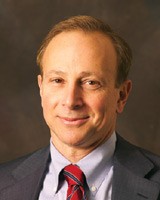
- Select a language for the TTS:
- UK English Female
- UK English Male
- US English Female
- US English Male
- Australian Female
- Australian Male
- Language selected: (auto detect) - EN
Play all audios:
You have full access to this article via your institution. Download PDF _WHY DO YOU THINK THE NOVARTIS BOARD DECIDED TO APPOINT SOMEONE WITH YOUR BACKGROUND TO RUN WORLDWIDE DISCOVERY
RESEARCH?_ Obviously I was not party to those decisions, so can give only post hoc speculations. I believe that Dan Vasella, the Novartis CEO and a physician himself, first wanted to ensure
a research focus on the patient — hence the hiring of a clinician. This also helped to ensure that integrative biology, the study of disease mechanisms _in vivo_, continues to stand front
and centre in the discovery process. Additionally, I am told Dan wanted a scientist who had made contributions in the genetic/genomic arenas, one who could bring a critical eye to those
endeavours, and who could recruit others similarly inclined. Maybe there was also a desire for renewal, but I should note that Novartis had more drugs approved in the last few years than any
other pharmaceutical company, and has a rich late pipeline, so my hiring, and the investment in Cambridge, were intended to build for the long term rather than to deal with a crisis. _WHAT
STEPS ARE YOU TAKING TO ENSURE THAT DISCOVERY RESEARCH FOLLOWS A PATIENT-CENTRED APPROACH?_ At its essence, drug discovery is clinical investigation. So the first question we ask when
assigning a priority to a project is whether the project, if successful, fulfils an unmet medical need. Additionally, we have formed a much closer, essentially syncytial network with the
clinical arm of Development. Now, from the very launching of a research project, a clinician is involved, helping to focus the best target populations and decide upon appropriate clinical
biomarkers. Of course, there are also fundamental approaches and platforms that may feed into many projects without a single defined disease area focus. With these, too, the priority
naturally ascends as evidence for clinical relevance clarifies. _HOW AND WHEN WILL YOU KNOW WHETHER THIS APPROACH IS WORKING?_ It would be pretentious and inaccurate (although not unheard
of) to point out one golden path to discovery. Not genomics, nor high-throughput technologies, nor combinatorial chemistry, nor any other information source or technology will suffice.
Neither can adopting a particular strategic focus, whether on patient need or on business. In fact, pharmaceutical discovery will always be one of the greatest challenges, because ultimately
it plays out in the human, a systems biology problem of the first order. Having said that, there is already evidence that novel targets can be revealed by genetic and genomic approaches,
and the process facilitated and validation accelerated by faster screening, better animal models, improved structural chemistry, and more complete informatic predictions. What you really
want to know is when will there be a quantal step-up in discovery of new drugs, and what is the single limiting hurdle to achieving this new plane of existence? Obviously, there has been
much hype around the Human Genome Project as the key. Maybe. But I suspect this genomic wave will reflect a gradual increase in tides rather than a tsunami. Phenotyping _in vivo_ (which is
really what is meant by the term 'functionalization') is information less readily captured and interpreted than is genome sequence, and extrapolation to human disease is hardly
straightforward. In any case, in my experience, prediction of scientific revolution is a relatively fruitless exercise. The discoveries that change our _Weltanschauung_ are never those we
can predict. _UNDERSTOOD, BUT WHAT CRITERIA WILL YOU YOURSELF USE TO GAUGE YOUR IMPACT ON RESEARCH AND DEVELOPMENT AT NOVARTIS OVER THE NEXT FEW YEARS?_ “Measurement began our might,” says
Yeats, who then immediately turns around to disparage precision as crushing creativity. I am more partial to science than was Yeats, but take the point: unless we are careful, what we can
measure inevitably drives out what we cannot. So I believe in separation of metrics. For the more predictable pieces, what I might term 'process improvement', we work hard to make
sure that the entire system works smoothly and throughput is ever increased. For the more innovative projects, we have a separate assay system, one that ensures the direction seems right and
progress is appropriate, but does not insist that the progress be linear, or even what we predicted. BOX 1: MARK C. FISHMAN PRESIDENT, NOVARTIS INSTITUTES FOR BIOMEDICAL RESEARCH Novartis
Institutes for BioMedical Research, 400 Technology Square, Cambridge, Massachusetts 02139, USA Mark C. Fishman, M.D., is President of the Novartis Institutes for BioMedical Research, which
is headquartered in Cambridge, Massachusetts, USA, and encompasses the global research operations of Novartis Pharmaceuticals. Before joining Novartis in 2002, Fishman was Professor of
Medicine at Harvard Medical School and Chief of Cardiology at the Massachusetts General Hospital (MGH). He was also the founding Director of the Cardiovascular Research Center of the MGH.
Fishman is renowned for his discoveries in developmental genetics, especially for his role in introducing the zebrafish as a genetic model organism. With Wolfgang Driever and his colleagues
at the MGH, he did the first large-scale genetic screen in this species, in parallel with Christiane Nüsslein-Volhard's laboratory in Tübingen, and developed much of the genomic
infrastructure that permitted the cloning of mutant genes. Using these mutations, the Fishman laboratory subsequently identified many essential steps and genes that control vertebrate
development, particularly of the heart and vessels, and showed the relevance of these genes to human disease. Fishman is a graduate of Yale College and Harvard Medical School. He did his
Internal Medicine Residency, Chief Residency and Cardiology training at the MGH, postdoctoral research training at the National Institutes of Health and sabbatical training with Philip Leder
in genetics at Harvard Medical School. He is the author of the best-selling textbook _Medicine_, now in its fifth edition. RIGHTS AND PERMISSIONS Reprints and permissions ABOUT THIS ARTICLE
CITE THIS ARTICLE Mark C. Fishman. _Nat Rev Drug Discov_ 3, 292 (2004). https://doi.org/10.1038/nrd1363 Download citation * Issue Date: April 2004 * DOI: https://doi.org/10.1038/nrd1363
SHARE THIS ARTICLE Anyone you share the following link with will be able to read this content: Get shareable link Sorry, a shareable link is not currently available for this article. Copy to
clipboard Provided by the Springer Nature SharedIt content-sharing initiative



